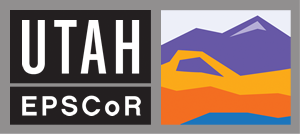 Previous EPSCoR News
Previous EPSCoR News
January 23, 2015
iUTAH will be featured nationally on SciTech Now

The SciTech Now series being broadcast on UEN-TV, captures the latest breakthroughs in science, technology and innovation. This Monday, January 26th at 8:30pm, SciTech Now’s will feature “iUTAH: Science for Utah’s Water Future” the statewide EPSCoR project to study water use throughout the state. Visit the UEN-TV web site to find your translator station. If you’re unable to watch Monday evening, you can view past episodes on uen.org/scitechnow after the program has aired. These programs are also broken down into segments for educational use. The iUTAH video was also selected to air nationally with other public UEN TV partners.
January 14, 2015
CI-WATER PI Fred Ogden honored by the American Society of Civil Engineers
Fred Ogden, who is a CI-Water principal investigator and leads the High-Resolution Multi-Physical Watershed Modeling Team, has been selected for the 2015 Arid Lands Hydraulic Engineering Award from the Environmental and Water Resources Institute of the American Society of Civil Engineers (ASCE). Fred is also the University of Wyoming's Cline Distinguished Chair of Engineering, Environment and Natural Resources.
Read More...
January 7, 2015
iUTAH Team Comes Together in Becoming EPSCoR Champions
On November 6-7, several of iUTAH’s researchers, leaders, educators, and graduate students gathered at the University of Utah for an interactive, hands-on communications workshop. The Becoming EPSCoR Champions workshop, hosted by the National Science Foundation (NSF), was created to help equip professionals with the skills to communicate in their future endeavors, which includes: obtaining grants, communicating with Program Officers, legislators, colleagues, administrators and the public, as well as everyday obligations.
Communications experts Dan Agan—a media strategist, communications counselor, and former PBS executive—and Joe Schreiber—an Emmy Award-winning TV producer and filmmaker—lead the two day workshop, hosted by Susan Mason, head of NSF’s External Affairs. They worked one-on-one with participants, sharing professional approaches and real-world insight to better participant’s messages, presentations, and speaking skills.
Over the course of two days, the group of thirteen participants focused on preparing and presenting four-minute speeches about iUTAH, as well as practicing their interviewing skills in two different filmed sessions. It was a fantastic opportunity to practice and develop important communication skills, and to interact with other EPSCoR participants.
iUTAH’s new Assistant Director, Andy Leidolf, said, “This was an incredible learning experience, and I feel privileged to have been a part of it. As somebody who has just come on board with iUTAH, I felt this also turned out to be a great team-building exercise. It would have been valuable to see more iUTAH participants take part in this great opportunity.”
The conference was also designed to facilitate better communication habits and provide tips for improvement. Participant and graduate student Yusuf Jameel said, “The EPSCoR workshop was really helpful in improving my presentation skills. The different segments of the workshop helped me improve my different shortcomings immensely. As scientists we tend to focus more on our work and less on how to communicate it. The workshop provided me with useful tips and information to display my work and knowledge to non-scientific audience in a scientific, yet lucid way. It also helped me focus on points that connect personally with my audience, avoiding details that can leave them uninterested and disconnected.”
At the end of the conference, our participants walked away with newfound skills that they can use in their everyday communications. Overall it was a beneficial learning experience that brought members of our team together as “ESPCoR Champions.”
April 2, 2014
The deadlines, LOI requirement, review, etc. are all the same as a non-EPSCoR proposal, but EPSCoR PIs can be funded from set-aside funds (~7.5 percent of the total program funds).
